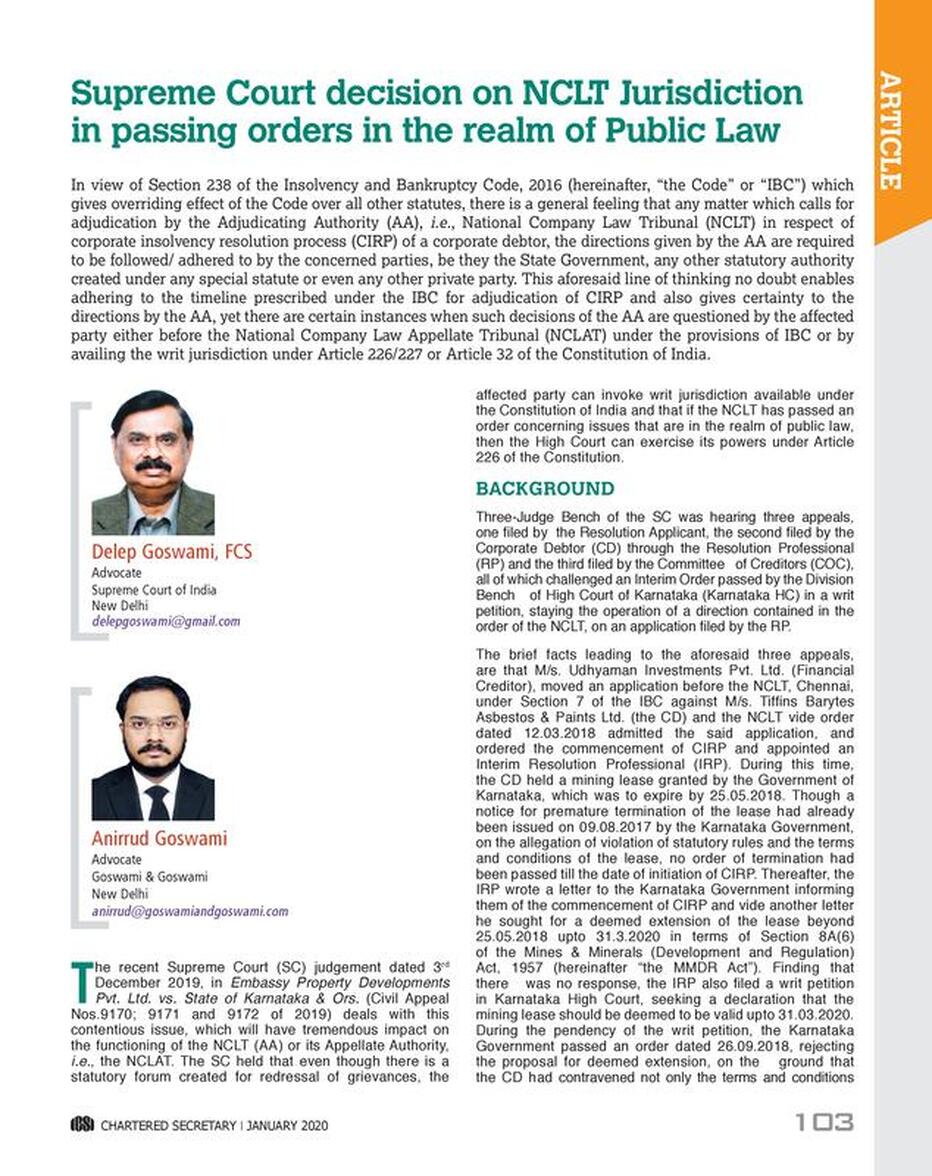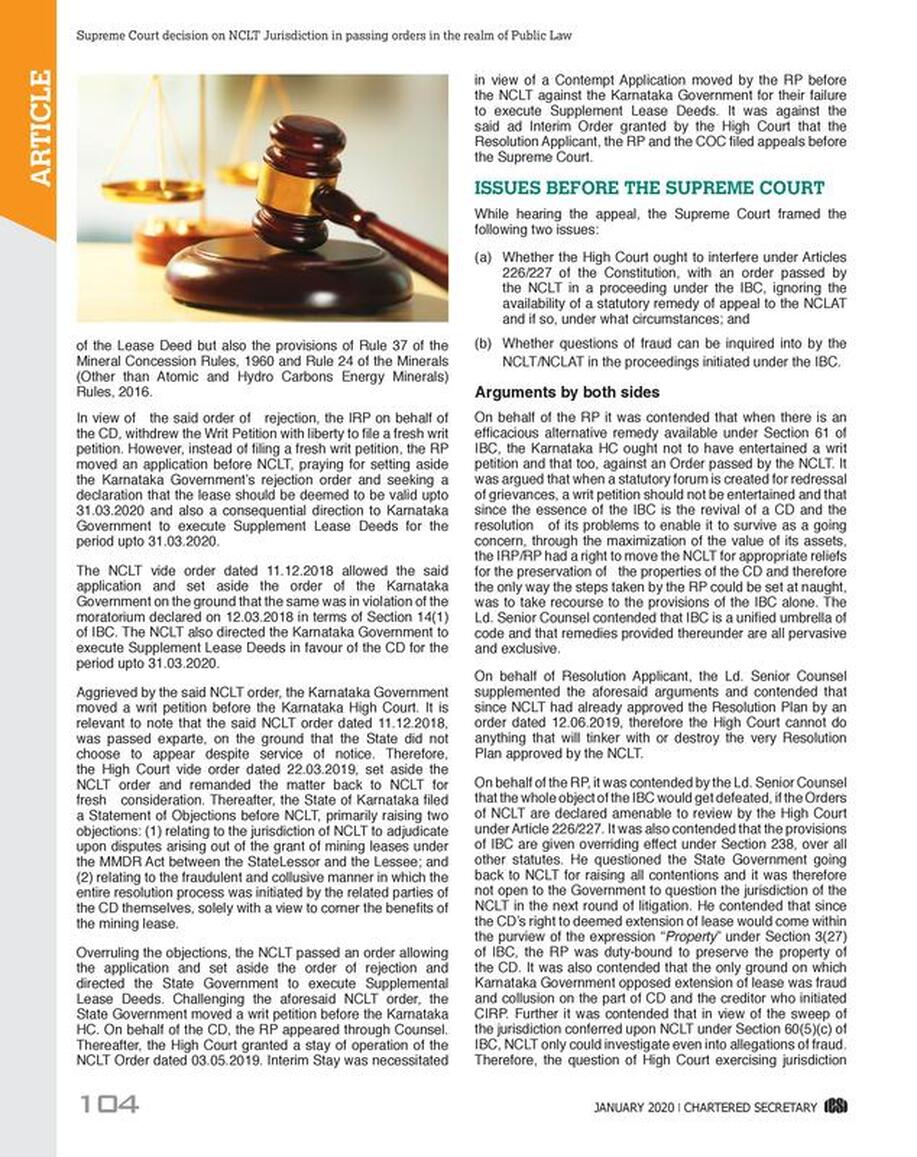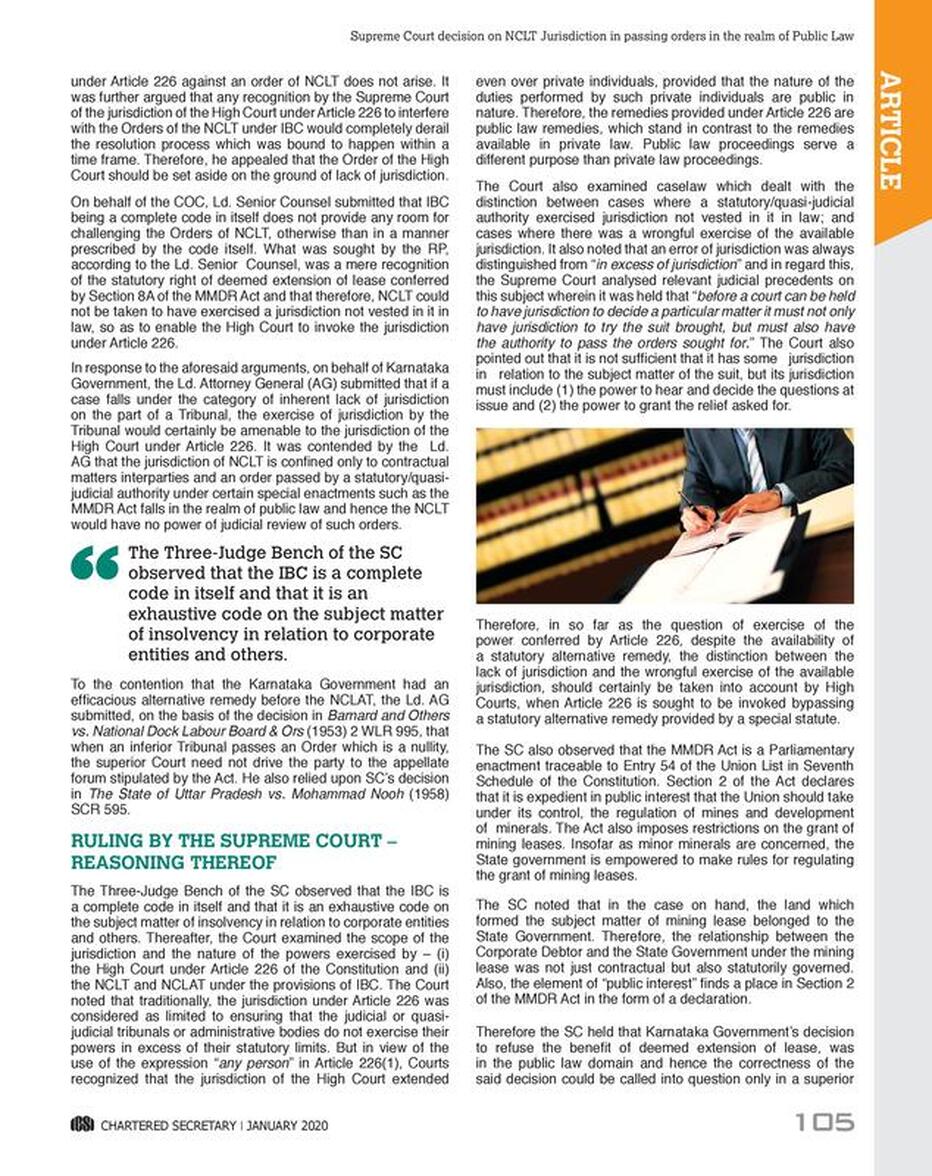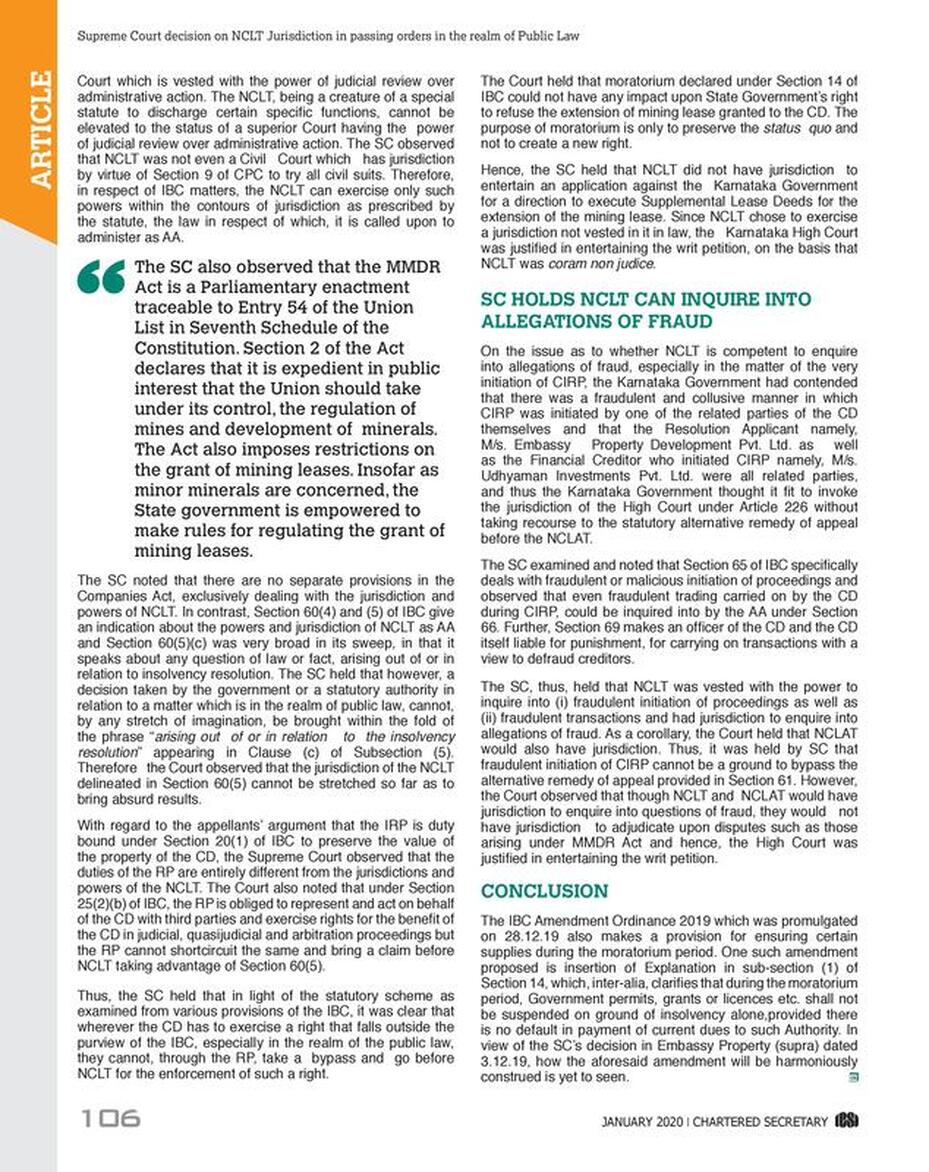 CSR Provisions under the Companies Act, 2013 1. The enactment of the Companies Act, 2013 (in short "the Act") and enforcement of most of the provisions of the said Act with effect from 1st April, 2014 brought about significant changes in the way business was being conducted by the corporate India. The Act stipulated stricter penal provisions for non-compliance of the provisions of the Act by companies and many provisions of the Act prescribed penalty, including imprisonment, for the persons responsible for the conduct of the day to day management of the companies. Section 135 of the Act, for the first time in India, introduced the provision for Corporate Social Responsibility (CSR) for certain specified profitable companies and the Schedule attached to the Act stipulated the areas where the companies could spend the CSR funds. The CSR provisions of the Act, when initially implemented w.e.f. 1.4.2014 mandated that any company having net worth of Rs. 500 crore and more; or having a turnover of Rs. 1000 crore or more; or a net profit of Rs. 5 crore or more, will have to constitute its CSR Committee of its Board of Directors (BoD) and was required to spend in each financial year 2% of its average net profits that the company made during the three immediately preceding financial years. The concerned company was required to disclose in its report prepared under Section 134(3) of the Act, the fact about the composition of its CSR Committee. Even though many corporate leaders and researchers voiced that since CSR spend is basically a voluntary activity and being philanthropic in nature, yet why does the Government have to step in by enacting a law mandating CSR spend. Yet, the seriousness attached by the Government to CSR activities of companies can be appreciated from the fact that said section 135 also mandated that the CSR Committee formed by the company shall formulate and recommend to its Board of Directors, a CSR Policy which shall include the activities to be undertaken by such a company as specified in Schedule VII to the Act; and also recommend the amount of expenditure to be incurred on the activities referred to by the CSR Committee. The law also mandated that the CSR Committee is required to monitor the CSR Policy of the company from time to time. Further, the second proviso to section 135(5) initially stipulated that if the company fails to spend such amount, the Board of Directors of the concerned company will have to include in its report prepared under section 134(3)(o) of the Act the reasons for not spending the amount and place before the general meeting a report on the details of the policy developed and implemented by the company on CSR initiatives and also report the reasons for such non-compliance of the mandated CSR provisions. Challenges Faced by Industry in Complying with CSR Laws 2. Many teething problems were being faced by the concerned companies and from time to time, necessary clarifications were issued by the nodal regulatory agency, viz., the Ministry of Corporate Affairs (MCA) to help the companies by answering their queries and towards this, expert committees were also formed by the MCA. One of the problems being faced by the companies mandated to spend CSR funds was with regard to the interpretation of the provisions of average net profits in the three preceding financial years and another problem was what would happen if the company could not discharge its mandated obligation of CSR spend fully and further, how the non-spent balance amount was to be treated/carried forward. Of course, the Government had been taking a very pragmatic view to ameliorate the difficulties being faced by the corporate sector and was quick to address their grievances so as to advance the concept of "ease in doing business". The Companies (Amendment) Ordinance, 2018 was promulgated on 2.11.2018 and it addressed several issues raised by the corporate sector. However, since this could not be converted into Act, the Companies (Amendment) Ordinance, 2019 was issued on 12.1.2019, but that Ordinance also could not be converted into Act. Hence, the Companies (Second Amendment) Ordinance, 2019 was issued on 21.2.2019. Thereafter, the Companies (Amendment) Act, 2019 was passed and it received the assent of the President of India on 31.7.2019 and it incorporated all provisions of the Companies (Second Amendment) Ordinance, 2019 and in addition thereto, some new provisions were added in the Companies (Amendment) Act, 2019. Amendments of the Act with Regard to CSR provisions 3. Even though several amendments and changes were made in the Act through the aforesaid Ordinances and the Companies (Amendment) Act, 2019, yet, for the purposes of this article, only those provisions which impact the CSR provisions of the Act are highlighted here: (i)For example, the difficulties faced by the companies with regard to the interpretation of the ambiguity in sub-section (1) of section 135 of the Act to the applicability of the CSR provisions were addressed and vide amendment with effect from 19.9.2018 in sub-section (1) of section 135 the term "any financial year" is substituted with "immediately preceding financial year"; (ii)Initially, the law mandated (in sub-section (5) of section 135) that the BoD of the concerned company shall ensure that the company spends in every financial year at least two per cent of average netprofits of the company made during the three immediately preceding financial years, in pursuance of its CSR Policy. The difficulty faced by the companies in adhering to this legal mandate was addressed by the Government and the Companies Amendment Act, 2019, thus, added the words "or where the company has not completed the period of three financial years, since its incorporation, during such immediately preceding financial years" in sub-section (5) of section 135. This amendment, as and when enforced by the Government, will clear the doubts which surfaced in interpreting the said provision; (iii)With regard to unspent CSR amount and its reporting in the Director's Report under section 134, the Companies Amendment Act, 2019, has inserted the words "and, unless the unspent amount relates to any ongoing project referred to in sub-section (6), transfer such unspent amount to a Fund specified in Schedule VII, within a period of 6 months of the expiry of the financial year." This change will clear the doubts being faced by the companies about the treatment to be given to the unspent CSR amount. (iv)To further amplify how the unspent CSR amount is to be treated, an altogether new provision, namely, sub-section (6) has been added to section 135 of the Act which reads as under: "(6) Any amount remaining unspent under sub-section (5), pursuant to any ongoing project, fulfilling such conditions as may be prescribed, undertaken by a company in pursuance of its Corporate Social Responsibility Policy, shall be transferred by the company within a period of thirty days from the end of the financial year to a special account to be opened by the company in that behalf for that financial year in any scheduled bank to be called the Unspent Corporate Social Responsibility Account, and such amount shall be spent by the company in pursuance of its obligation towards the Corporate Social Responsibility Policy within a period of three financial years from the date of such transfer, failing which, the company shall transfer the same to a Fund specified in Schedule VII, within a period of thirty days from the date of completion of the third financial year." The aforesaid amendment is significant because it amply clarifies the treatment to be given by the concerned company with regard to its unspent CSR fund and mandates that despite such transfers, if any balance amount still remains unspent, it shall be transferred to a Fund specified in Schedule VII of the Act. (v)While, in its enthusiasm to ensure that the Parliament mandated CSR provisions in the Act are not taken lightly and are implemented in all seriousness by the industry concerned, the Government introduced through the Companies (Amendment) Act, 2019 stringent penal provisions including imprisonment for non-compliance of the CSR law. A new sub-section (7) was inserted to section 135, which reads as under: "(7) If a company contravenes the provisions of sub-section (5) or sub-section (6), the company shall be punishable with fine which shall not be less than fifty thousand rupees but which may extend to twenty-five lakh rupees and every officer of such company who is in default shall be punishable with imprisonment for a term which may extend to three years or with fine which shall not be less than fifty thousand rupees but which may extend to five lakh rupees, or with both." Since the terms "officer" defined in sub-section (59) of section 2 of the Act includes any Director or Key Managerial Personnel or any other person in accordance with whose directions or instructions the Board of Directors or any one or more of the Directors is or are accustomed to act, the aforesaid penal provision substantially affected the companies to which CSR provisions apply. Naturally, introduction of the stricter penal provisions were severely criticised and demands were made to decriminalise the said penal provisions and to make them civil in nature. In deference to the wishes of the corporate sector, the Government has not yet notified enforcement of the newly introduced penal provisions. In this regard it is worthwhile to note that the MCA had set up a Company Law Committee (CLC) on 18.09.2019 to make recommendations to the Government to, inter alia, re-categorize certain criminal compoundable offences to civil wrongs, carrying civil liabilities, to facilitate and promote ease of doing business and ease of living. The excerpt of the said CLC report dated 14.11.2019 with regard to penal provision under sub-section (7) of section 135 of the Act reads as under: "In case of default, the company shall be levied a penalty equal to twice the unspent CSR amount which is required to be transferred to the Account under sub-section (6) or one crore rupees, whichever is lower, whereas the officer in default shall be levied a penalty equal to one tenth of the unspent CSR amount which is required to be transferred to the Account under sub-section (6) or two lakh rupees, whichever is lower." The aforesaid recommendation, if accepted and incorporated eventually into the Act, will definitely help the companies in promoting ease of doing business and the Damocles' Sword of imprisonment hanging over the directors and officers of the companies due to non-compliance of CSR laws and regulations will get removed and it will help not only in ease of doing business but also ease of living by the concerned Directors and officers of the companies. This appears to be a welcome move and requires urgent consideration by the MCA. (vi) Further, another significant recommendation of the CLC is that a suitable provision be inserted in section 135(1) of the Act to enable the Central Government to enhance the threshold limits for triggering applicability of CSR provisions by way of Rules. However, critics point out that how such delegated legislation will go well with the principles enunciated in the Constitution of India needs to be seen, as such delegated legislation may be challenged in the Court. Current Status of CSR provisions in India 4. As reported in The Economic Times on 20th November 2019, the Minister of State for Finance and Corporate Affairs, in reply to a question on 19th November 2019 in the Rajya Sabha has said that CSR expenditure by the private sector companies increased from Rs. 10,302.50 crore in 2015-16 to Rs. 11,067 crore in 2017-18. However, the CSR spend by Public Sector Undertakings (PSUs) was Rs. 3,296 crore in 2016-17 came down to Rs. 2,553.36 crore in 2017-18. The Minister further clarified that the companies could now count contribution towards designated technology incubators and contributions to public funded institutions like IITs, national laboratories and autonomous bodies engaged in research as part of company's CSR expenditure. It needs to be noted that vide Notification issue on 11th October 2019 and its corrigendum dated 19th November 2019, the Ministry of Corporate Affairs has amended Schedule VII of the Act which relates to activities which may be included by the companies in their CSR policies. National CSR Awards 5. In this regard it is also pertinent to mention that National CSR awards have been instituted by the MCA to recognize corporate initiatives in the areas of CSR to achieve inclusive growth and sustainable development. The Indian Institute of Corporate Affairs, think-thank of the MCA, had rendered technical and logistics support for the conduct of the rigorous award process. At a function organized on 29th October 2019, the Hon'ble President of India observed that contribution through CSR is a true manifestation of the Trusteeship philosophy of the Father of the Nation. Awards were given under two categories, namely "Corporate Award for Excellence in CSR" and "Contribution of CSR in Challenging Circumstances". At the said award function, the Hon'ble Finance Minister also said that CSR is not merely contribution of funds by the corporate sector, but it is their contribution towards inclusive societies and this is a significant matter. Also, the Secretary, MCA, at the said function said CSR is no longer an act of philanthropy, rather it now flows out of business responsibility towards society and environment. This trend clearly indicates the positive manner in which the CSR activities are now being looked at by the Government. Conclusion 6. The decision of the Government to keep in abeyance enforcement of the criminal prosecution provisions which were enacted by the Companies Amendment Act 2019 in sub-section (7) of the section 135 of the Act will in effect halt the move for criminalization of violations of the CSR laws. Further, once the Government enforces the provisions of sub-section (6) of section 135 of the Act which allows flexible treatment to unspent CSR funds, it is hoped that the companies will heave a sigh of relief and the 5,382 companies to whom show-cause notices were issued by the MCA for CSR violations, will get an opportunity to conform to the Governmental directions with regard to CSR spend. Hopefully, this pragmatic approach will definitely create a conducive atmosphere for such an important aspect in corporate functioning, namely, the corporate social responsibility. ■■
0 Comments
1/9/2020 0 Comments Key Highlights of Protective Provisions to Stressed-Asset Buyers Under IBC (Second Amendment) Bill, 2019 Published by Taxmann Publications in 'Sebi & Corporate Laws' Journal [2019] 112 taxmann.com 286 (Article) Date of Publishing: December 17, 2019 On Thursday, 12th December, 2019, the Insolvency and Bankruptcy Code (Second Amendment) Bill, 2019 was introduced in the Lok Sabha and the Bill, inter-alia, introduces many new provisions, most importantly the provisions which accord protection to stressed-asset buyers and also enhances the limit for home-buyers and debenture-holders (treated as financial creditors) for initiating corporate insolvency resolution process (CIRP) and this provision is proposed to be given retrospective effect. The intent of the IBC Second Amendment Bill aims at removing the difficulties and hurdles being faced by the new stressed-asset buyers and to make acquisition of the stressed-assets through CIRP more attractive to the investors. This article is an attempt to highlight only some of the key provisions of the Second Amendment Bill and it is expected to enlighten the professionals about the implication of the proposed amendments. While introducing the IBC Second Amendment Bill 2019, the Union Finance Minister reiterated the statement of objects and reasons for the Insolvency and Bankruptcy Code, 2016 (the Code) which was enacted with a view to consolidate and amend the laws relating to reorganisation and insolvency resolution of corporate persons, partnership firms and individuals in a time-bound manner for maximisation of value of assets of such persons, to promote entrepreneurship, availability of credit and balance the interests of all the stakeholders. Need for the IBC Second Amendment Bill 2019 As highlighted at the time of introduction of the IBC 2nd Amendment Bill 2019, Union Finance Minister stated that a need was felt to give the highest priority in repayment to last mile funding to corporate debtors to prevent insolvency, in case the company goes into corporate insolvency resolution process or liquidation, to prevent potential abuse of the Code by certain classes of financial creditors, to provide immunity against prosecution of the corporate debtor and action against the property of the corporate debtor and the successful resolution applicant, subject to fulfilment of certain conditions, and in order to fill the critical gaps in the corporate insolvency framework. Protection accorded to acquirer of stressed-assets under IBC The IBC 2nd Amendment Bill 2019 proposes to introduce a new section, namely Section 32A so as to provide that the liability of a corporate debtor for an offence committed prior to the commencement of the CIRP shall cease under certain circumstances enumerated therein. Sub-Section (1) of the proposed Section 32A reads as under: "After section 32 of the principal Act, the following section shall be inserted, namely:-- "32A. (1) Notwithstanding anything to the contrary contained in this Code or any other law for the time being in force, the liability of a corporate debtor for an offence committed prior to the commencement of the corporate insolvency resolution process shall cease, and the corporate debtor shall not be prosecuted for such an offence from the date the resolution plan has been approved by the Adjudicating Authority under section 31, if the resolution plan results in the change in the management or control of the corporate debtor to a person who was not-- (a) a promoter or in the management or control of the corporate debtor or a related party of such a person; or (b) a person with regard to whom the relevant investigating authority has, on the basis of material in its possession, reason to believe that he had abetted or conspired for the commission of the offence, and has submitted or filed a report or a complaint to the relevant statutory authority or Court: Provided that if a prosecution had been instituted during the corporate insolvency resolution process against such corporate debtor, it shall stand discharged from the date of approval of the resolution plan subject to requirements of this sub-section having been fulfilled: Provided further that every person who was a "designated partner" as defined in clause (j) of section 2 of the Limited Liability Partnership Act, 2008, an "officer who is in default", as defined in clause (60) of section 2 of the Companies Act, 2013, or was in any manner incharge of, or responsible to the corporate debtor for the conduct of its business or associated with the corporate debtor in any manner and who was directly or indirectly involved in the commission of such offence as per the report submitted or complaint filed by the investigating authority, shall continue to be liable to be prosecuted and punished for such an offence committed by the corporate debtor notwithstanding that the corporate debtor's liability has ceased under this sub-section." Therefore, as can be seen from the aforesaid, while the new acquirer of stressed-asset gets protection from prosecutions launched against the corporate debtor, the said protection does not extend to the erstwhile promoters, directors, key managerial personnel, associates or related parties of the erstwhile promoters of the corporate debtor who were directly or indirectly involved in the commission of such offence as per the report submitted or complaint filed by the investigating authority. It is also pertinent to mention that sub-section (2) of the proposed Section 32A which is being introduced, clearly specifies that "no action shall be taken against the property of the corporate debtor in relation to an offence committed prior to the commencement of the corporate insolvency resolution process of the corporate debtor, where such property is covered under a resolution plan approved by the Adjudicating Authority under section 31." The aforesaid immunity to the corporate debtor under Section 32A(1) and to the properties of the corporate debtor under Section 32A(2) is applicable only in respect of the approved resolution plan under Section 31 of the IBC or sale of liquidation assets under the provisions of Chapter III of Part II of the IBC which results in a change of control of the corporate debtor to a person who was not (a) a promoter or in the management or control of the corporate debtor or a related party of such a person; or (b) a person with regard to whom the relevant investigating authority has, on the basis of material in its possession reason to believe that he had abetted or conspired for the commission of the offence, and has submitted or filed a report or a complaint to the relevant statutory authority or Court. In this connection, it is relevant to note that the aforesaid proposed changes in the IBC do not dilute or exempt the liability of the erstwhile director or partner of the corporate debtor, as the case may be, as per Section 66 of the IBC, who was involved in fraudulent trading or wrongful trading or who knew or ought to have known that there was no reasonable prospect of avoiding the commencement of a CIRP in respect of such corporate debtor and who did not exercise due diligence in minimising the potential loss to the creditors of the corporate debtor. On an application made by the resolution professional during CIRP, the Adjudicating Authority may by an order direct that such a person shall be liable to make such contribution to the assets of the corporate debtor as it may deem fit. Even though this is a very important provision available to the Resolution Professional during CIRP, yet it is rarely used, which could have deterred economic offenders. Interestingly, Explanation (ii) to the proposed Section 32A(2) clarifies that nothing prevents from initiating action against the property of any person other than the corporate debtor or a person who has acquired such property through corporate insolvency resolution process or liquidation process under this Code and fulfils the requirements specified in this section, against whom such an action may be taken under such law as may be applicable. Proposed sub-section (3) of Section 32A mandates that notwithstanding the immunity given in this section, the corporate debtor and any person who may be required to provide assistance under such law as may be applicable to such corporate debtor or person, shall extend all assistance and co-operation to any authority investigating an offence committed prior to the commencement of the corporate insolvency resolution process. In this connection, it is relevant to note that the aforesaid proposed changes in the IBC do not dilute or exempt the liability of the erstwhile director or partner of the corporate debtor, as the case may be, as per Section 66 of the IBC, who was involved in fraudulent trading or wrongful trading or who knew or ought to have known that there was no reasonable prospect of avoiding the commencement of a CIRP in respect of such corporate debtor and who did not exercise due diligence in minimising the potential loss to the creditors of the corporate debtor. On an application made by the resolution professional during CIRP, the Adjudicating Authority may by an order direct that such a person shall be liable to make such contribution to the assets of the corporate debtor as it may deem fit. However, it may be important to highlight that the immunity granted under Section 32A of the IBC Amendment Bill is likely to create problems for the investigating agencies like Serious Fraud Investigation Office (SFIO), Enforcement Directorate (ED), Central Bureau of Investigation (CBI), prosecuting agency of the Ministry of Corporate Affairs and may delay completion of the prosecution of such offenders till the aforesaid immunity provisions get tested in the Courts of law and the critical issues get settled. Enhancement of Minimum Threshold for Certain Financial Creditors to Initiate CIRP As per the existing Section 7 of the IBC, a financial creditor, either by itself or jointly with other financial creditors or any other person on behalf of the financial creditor, as may be notified by the Central Government, may file an application for initiating corporate insolvency resolution process against a corporate debtor before the Adjudicating Authority when a default has occurred. The IBC 2nd Amendment Bill 2019 proposes to enhance the threshold limit for initiating CIRP by certain classes of financial creditors and new provisos are being inserted in sub-section (1) of the existing Section 7 of the IBC. Basically, the first proviso proposed to be inserted deal with such class of financial creditors as referred to in clauses (a) and (b) of sub-section (6A) of Section 21 of the IBC and in respect thereof, an application for initiating corporate insolvency resolution process shall be filed jointly by not less than one hundred of such creditors in the same class or not less than ten per cent. of the total number of such creditors in the same class, whichever is less. The next proviso proposed to be inserted in Section 7 of the IBC relates to financial creditors who are allottees under a real estate project and states that an application for initiating corporate insolvency resolution process shall be filed jointly by not less than one hundred of such allottees under the same real estate project or not less than ten per cent of the total number of such allottees under the same real estate project, whichever is less. The Bill further clarifies that where an application for initiating the corporate insolvency resolution process against a corporate debtor has been filed by a financial creditor referred to in the first and second provisos and has not been admitted by the Adjudicating Authority before the commencement of the Insolvency and Bankruptcy Code (Second Amendment) Act, 2019, such application shall be modified to comply with the requirements of the first and second provisos within thirty days of the commencement of the said Act, failing which the application shall be deemed to be withdrawn before its admission. This change is proposed to be made applicable retrospectively and may face some legal objections from affected quarters. Going-Concern Basis of Corporate Debtor During CIRP – Extension of Licences, Permits, etc. Another significant amendment introduced in the IBC 2nd Amendment Bill 2019 relates to the facilitating the operation of the corporate debtor as a "going concern" during the CIRP. The Bill proposes to insert the following 'Explanation'to the sub-section (1) of Section 14 of the Code "For the purposes of this sub-section, it is hereby clarified that notwithstanding anything contained in any other law for the time being in force, a license, permit, registration, quota, concession, clearances or a similar grant or right given by the Central Government, State Government, local authority, sectoral regulator or any other authority constituted under any other law for the time being in force, shall not be suspended or terminated on the grounds of insolvency, subject to the condition that there is no default in payment of current dues arising for the use or continuation of the license, permit, registration, quota, concession, clearances or a similar grant or right during the moratorium period" Also, after sub-section (2) of Section 14, the following new sub-section is proposed to be inserted, namely: "(2A) The supply of goods or services that the interim resolution professional or resolution professional, as the case may be, considers critical to protect and preserve the value of the corporate debtor and manage the operations of such corporate debtor as a going concern, then the supply of such goods or services shall not be terminated, suspended or interrupted during the period of moratorium, except if such corporate debtor has not paid dues arising from such supply during the moratorium period or in such circumstances as may be specified." Conclusion While upholding the constitutional validity of the IBC, the Supreme Court of India in Swiss Ribbons v. Union of India [2019] 101 Taxmann.com 389/152SCL365 has stated that the IBC is a legislation which deals with economic matters and, in the larger sense, deals with the economy of the country as a whole. The experiment contained by the Code judged by the generality of its provisions and not by the so-called crudities and inequities have passed Constitutional muster. In the working of the Code, the flow of financial resources to the commercial sector in India has increased exponentially as a result of financial debts being repaid. The experiment conducted in enacting the Code is proving to be largely successful. The defaulter's paradise is lost. In its place economy's rightful position has been regained. The proposed amendment in the IBC 2nd Amendment Bill 2019 is in the right direction to facilitate the Government's keenness to promote ease in doing business in India and also helps in removing certain bottlenecks in sale/change of hands in respect of the stressed-assets and also to streamline initiation of CIRP in respect of real estate companies. The changes proposed are definitely a welcome move which augurs well for the Indian business scenario. ■■ |
Author@Delep Goswami, F.C.S., Advocate; Archives
November 2021
Categories |





 RSS Feed
RSS Feed
